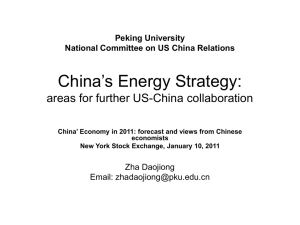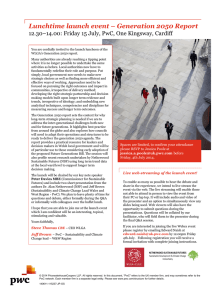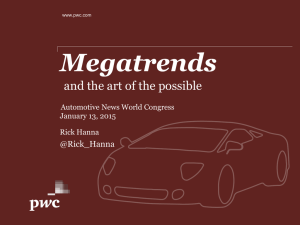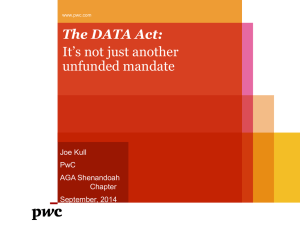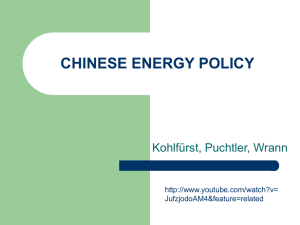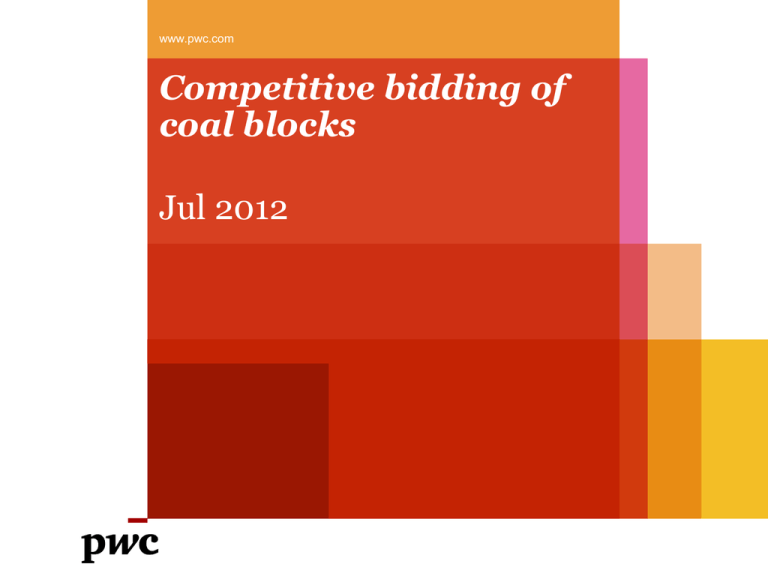
www.pwc.com
Competitive bidding of
coal blocks
Jul 2012
Agenda
• The local and global context
• The auction opportunity
• Strategies for competitive bidding
Competitive Bidding of coal blocks
PwC
Jul 2012
2
The local context
• The challenges of strong demand growth and it’s features;
• Coal dominates current and incremental energy use;
• Supply diversity is limited, and resource nationalism is rising;
e.g., super profit tax, carbon levy, DMO, transfer pricing, equity/profit share, shorter tenor of supply contracts
Commercial
fuel access
Population
without
electricity
South Africa
83%
12 m
16%
China
42%
8m
38%
Vietnam
34%
9m
39%
Country
Commercial
fuel subsidy
(% of total)
Pakistan
32%
70 m
18%
India
29%
405 m
50%
Source: G-20 Joint Subsidy Report June 2010
Generation Capacity (GW)
Hydro-
37
Nuclear
4.6
Renew
able 17
Therm
al- 106
Source: CEA 2010
Commercial fuels in above table: Power, LPG, Kerosene
Competitive Bidding of coal blocks
PwC
Jul 2012
3
The global context
The growing disconnect
• 2011: a year of a great contrast –
record profits for the Top 40 of
$133 billion (up 26%) but market
cap. fell by 25%
• Top 40 invested $98 billion in
capital projects in 2011. Plan for
a further $140 billion in 2012
• Continue to see high commodity
prices, underwritten by higher
production costs, lower grades.
• The key is the ability to bring on
supply through the right projects.
Competitive Bidding of coal blocks
PwC
Jul 2012
4
Capital expenditure up to $98 billion
Capital expenditures by commodity
($ billion)
Capital expenditures by location
($ billion)
35
25
30
20
25
15
20
15
10
10
5
5
-
Source: PwC Analysis
Competitive Bidding of coal blocks
PwC
-
2011
2010
2011
2010
Source: PwC Analysis
Jul 2012
5
Key provisions of auction rules
Auction by Competitive Bidding of Coal Mines Rules, 2012
• Rules issued (Feb 2012) for auction of coal blocks
• End-use and mode specified for identified coal blocks (54; 18 BT)
• Earmarking of coal blocks:
• Auctioning of coal blocks:
- For Government cos. in steel
or power (16; 7.27 BT) at
Reserve Price.
- Bidders to submit Technical
and Commercial offers
- For power, through tariff
based competitive bidding
(16; 8.16 BT).
- Floor / Reserve Price: to be
notified for each area.
Competitive Bidding of coal blocks
PwC
- (22, 2.79 BT)
Jul 2012
6
Coal blocks identified for allocation
End use
No. of
blocks
Resources
(MT)
Earmarked
for Govt.
companies
Allocation route
1.
Reserve Price for blocks
earmarked for Govt. Cos.
Highest bid price for others
Integrated
Steel
12
Cement
7
637
0
Highest bid price (>Floor price)
Sponge Iron
5
381
0
Highest bid price (>Floor price)
Surface
Gasification
2
136
0
Highest bid price (>Floor price)
4415
4
2.
Power
16
8165
Not yet
finalised
Commercial
mining
12
4453
12
Blocks earmarked for both
1. Tariff based bidding and
2. Central Government Cos., for
allocation at Reserve Price
Reserve Price
Source: MoC notice “Identification of coal blocks for allocation and earmarking for various sectors” dated 30 May 2012
Competitive Bidding of coal blocks
PwC
Jul 2012
7
Key issues
• Areas not identified yet for allocation
- allocation or pending exploration
• How is technical criteria determined?
- sub-rules, standard bidding documents
• Balancing growth imperative with industry structure
- delivering capacity vs. competition
• How will bidders respond?
Competitive Bidding of coal blocks
PwC
Jul 2012
8
Strategies for competitive bidding
• Early preparation and a clear strategy
• Key decisions (asset, end-use, design, technology, partner)
Cost-side
Revenue-side
• JV with mining majors
• Inter-se terms with the end-use
plant (more, if surplus or group
sale is permitted)
• Equipment sizing
• Transportation options
• Diversify risk into MDO contract
• Financing strategy
Competitive Bidding of coal blocks
PwC
• Design of end-use plant
• Assured fuel availability
• Quality and grade control
Jul 2012
9
Setting the objectives
Objectives for the
overall bid
Be competitive to
secure PPAs in tariff
based bidding close
to regulated rates
(reasonable returns
in steel and cement)
• market share
• productivity gains
and financing
Competitive Bidding of coal blocks
PwC
Objectives for the
mining activity
Mine planning,
capital expenditure,
and good operating
practices to keep
costs low/optimal.
• activities
• equipment
• availability
• contracts
Objectives for the
auction process
Managing one’s
participation in bid
process
• modelling
• risk mitigation
• procurement
• technical scores
Jul 2012
10
Assessing the components
Land
• Land required can be optimized in mining plan
by simultaneous back filling of mined area or inpit dumping of OB. Can save land cost by 10%
depending on site condition and mine size.
R&R
• Impact assess, training and deployment,
Water supply
• Effluent treatment for re-use and minimizing
loss of water in mining process over mine life.
Logistics
• Location, capacity, terrain, layout for material
movement (rail, road, slurry, conveyer, etc)
Competitive Bidding of coal blocks
PwC
Jul 2012
11
Assessing the components
HEMM
• Based on the mine plan, method of mining,
production plan etc. Broadly, higher equipment
size is seen to reduce costs by about 20-30%.
• Strategic sourcing and supplier performance.
Operational
costs
• Equipment scheduling, Placement (e.g., location
diesel sump) , Operating protocols etc., optimize
cycle time, reducing operational costs (0.5 min
less cycle time equates to 1.75 haul trucks in the
fleet, thus saving capex and operating cost).
Maintenance
costs
• Maintenance planning & scheduling: proper
planned maintenance reduces cost by 10-15%.
• Operator training; early problem identification.
Competitive Bidding of coal blocks
PwC
Jul 2012
12
Maintenance management
Total (100%)
Activity
Planned /
Productive
Maintenance
Unplanned
Corrective
Breakdown
Total
Company %
Multiplier
Units
Costs total for
150 units
60%
1
60
$40 million
20%
1.5
30
$20 million
20%
3
60
$40 million
100%
-
150
$100 million
Planned
(60%)
Unplanned
(40%)
PM (30%)
Corrective
(30%)
Breakdown
(20%)
Corrective
(20%)
Emergency
(10%)
Urgent (10%)
Activity
Planned /
Productive
Maintenance
Unplanned
Corrective
Breakdown
Total
Company %
Multiplier
Units
Costs total for
118 units
80%
1
80
$53 million
15%
1.5
22.5
$15 million
5%
3
15
$10 million
100%
-
117.5
$78 million
Total (100%)
Planned
(80%)
PM (45%)
Corrective
(35%)
Competitive Bidding of coal blocks
PwC
Fleet reduction
Unplanned
(20%)
Breakdown
(5%)
Corrective
(15%)
Emergency
(1%)
Urgent (4%)
Jul 2012
13
Assessing the components
Explosives
• Optimum rate of advance, size of fragmentation
can be achieved by selecting right explosives
(blasting has 3:1 cost advantage over crushing /
grinding; proper technique reduces sizing cost)
POL
costs
• Procurement strategy for POL can help reduce
its cost over mine life.
• Mobile / in-pit refilling practices help enhance
utilization time.
Balancing
plant
Competitive Bidding of coal blocks
PwC
• Ancillary plant designed for optimize use.
• Beneficiation plant design capability.
Jul 2012
14
Assessing the components
Grade control
and mill feed
variability
Others
Competitive Bidding of coal blocks
PwC
• Match ROM coal sizing to end use requirement:
production cost varies by the size of coal needed
(current pricing suggests 50% reduction in size
increases unit cost by 25-60%. Impacts boiler
performance; penalty high at 30-50% of price).
•
•
•
•
Metallurgical and geological interpretation.
Safety and statutory requirements.
Shared facilities and resources.
Historical experience, site specific constraints.
Jul 2012
15
In conclusion
• For the Governments
- deliverability of projects
- transparency, public interest, and equity
• For the consumers
- improved supply and standards
• For the bidders / investors
- security of supply
- bid strategy
Competitive Bidding of coal blocks
PwC
Jul 2012
16
Thank you
This publication has been prepared for general guidance on matters of interest only, and does
not constitute professional advice. You should not act upon the information contained in this
publication without obtaining specific professional advice. No representation or warranty
(express or implied) is given as to the accuracy or completeness of the information contained
in this publication, and, to the extent permitted by law, [insert legal name of the PwC firm], its
members, employees and agents do not accept or assume any liability, responsibility or duty of
care for any consequences of you or anyone else acting, or refraining to act, in reliance on the
information contained in this publication or for any decision based on it.
© 2010 PricewaterhouseCoopers India Ltd. All rights reserved. In this document, “PwC” refers
to PricewaterhouseCoopers India Ltd which is a member firm of PricewaterhouseCoopers
International Limited, each member firm of which is a separate legal entity.


